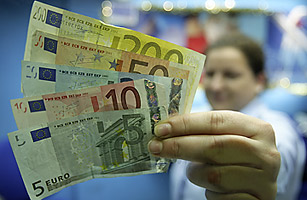
A handful of euro notes
Ideas
Conventional predictions lead us to fear that Europe, like other dominant civilizations from Egypt to the Roman Empire, has entered a period of decline — a decline that, at least from a statistical point of view, seems unstoppable. Europe now has, compared with its main competitors, the lowest birthrate (with the exception of Japan), the highest unemployment rate, the oldest population, the highest social expenditures, the lowest industrial-growth rate, the weakest industrial research in key sectors of information technology, the fewest new patents. Even its renowned financial markets are heading toward fragility. And though its share of the worldwide GNP remains high — above 20% — this too will drop rapidly in the future.
Thus everything is shaping up for 21st century Europe to become little more than a "Venetian Continent," visited by millions of Asians and Americans, inhabited by tourist guides, museum caretakers and hotelkeepers. In the big global bazaar, the place occupied by European companies, products, ideas, literature, music and cinema will soon be taken over by objects, services, sounds, noises, words and images from elsewhere.
This worst-case scenario — which will come true if market forces alone dictate the outcome — can be described in these terms: 20-odd European countries will be assembled into a single European Union, a unified economic space in which a dozen or so of these states will share a new common currency, the euro. This large market, entirely open to outside investment, will have no common budgetary, fiscal or social policy. It will be under the domination of the Continent's premier industrial power, Germany, which will turn the euro into a kind of supermark. Lacking financial resources of its own, this monetary union will probably not create social mechanisms capable of compensating for the devastating effects on employment caused by productivity differences between regions.
This could lead the richest regions — such as Piedmont, Catalonia and Flanders — to refuse joint liability for their less fortunate neighbors and to decide to talk directly with European Community authorities in Brussels and Frankfurt. Faced with a rapidly growing membership, the Union will no longer be able to remain a decision-making center with a coherent economic and security policy or a credible defense. Lacking a strong common will, moreover, most of the European Union countries will be unable to reduce their tax burdens. They will cease to be competitive because of high labor costs, which will move various activities toward Africa and Asia and thereby increase European unemployment. According to this scenario, only Germany will be able to get by, if it manages to maintain its social consensus, its banking resources and its lead in certain key sectors. Even then, Germany will be held back by the recessionary climate surrounding it.
At the same time, all European countries will raise military spending because of a double threat. To the east, there will be a Russia in turmoil, financially drained and gradually fragmented into more or less autonomous provinces, several of which have nuclear armies run by one or more local generals. To the south, there will be a Maghreb tested by a radical Islam, where millions of desperate inhabitants will be tempted to cross the Mediterranean, thus multiplying the risks of all kinds of destabilization. In sum, if the countries of Europe remain divided, the most probable outcome is that the market will impose a destructive every-man-for-himself approach that will make Europe, at best, a Venetian continent and, at worst, a Buenos Aires continent, which means decay with dictators.
Yet Europe still has the means to become the premier economic power of the 21st century. To do this, it will need to realize that the marketplace alone will not assure its future. What would have happened to North America if, in the 19th century, economic laws were the only ones dictating the social order? It would have become a land of anarchy and dictatorships. To build the U.S., there needed to be a political will, a view of the future and institutions that adequately reflected the aspirations of its people. In the same way, Europe will be doomed to be a Venetian continent unless it imitates the Founding Fathers of the U.S. This requires creation of a vision of Europe 50 years down the road and the judging of all actions according to how they contribute to this vision. In setting its agenda, Europe must:
Establish political institutions to complete the common currency.
Europe must create a treasury ministry, a supreme court and a senate to represent its member countries. And with these institutions it must launch, with the help of the private sector, a massive, 20-year program to install a network of communications infrastructure connected to the Internet. Once that is done, European tourism, the No. 1 industry of the 21st century, will be a strength and not a sign of decline.